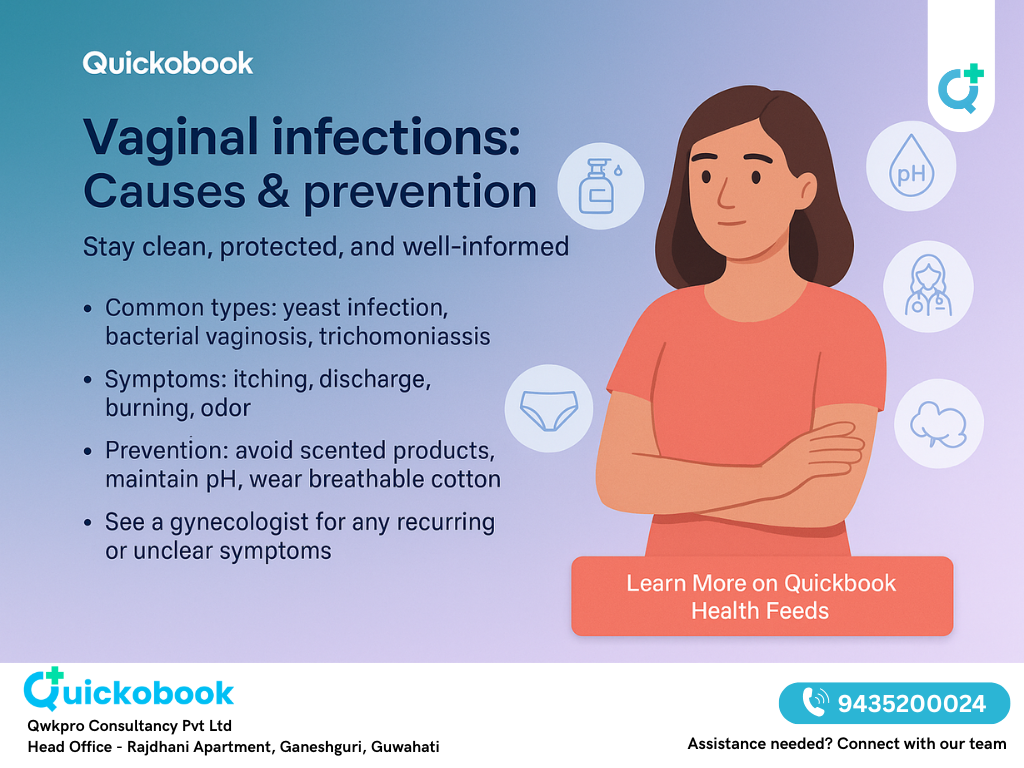Introduction
Vaginal infections are among the most common health issues women face in India. They can cause discomfort, itching, unusual discharge, and in some cases, serious complications if left untreated. While many women feel embarrassed to talk about these problems, consulting a gynaecologist early can prevent long-term issues. With platforms like Quickobook doctor consultation, women can now access reliable care from the comfort of their homes.
This blog will cover everything you need to know about vaginal infections—their causes, types, symptoms, diagnosis, treatment, prevention, and when to see a doctor.
What Are Vaginal Infections?
Vaginal infections occur when bacteria, fungi, or parasites disturb the natural balance of microorganisms in the vagina. The vagina normally has healthy bacteria (lactobacilli) that maintain an acidic environment, but when this balance is disrupted, infections may develop.
Common Types
- Yeast Infection (Candidiasis) – Caused by Candida fungus.
- Bacterial Vaginosis (BV) – Due to overgrowth of harmful bacteria.
- Trichomoniasis – A sexually transmitted infection (STI) caused by a parasite.
- Chlamydia & Gonorrhea – STIs that can also cause vaginal symptoms.
Causes of Vaginal Infections
- Poor vaginal hygiene
- Unprotected sex (risk of STIs)
- Overuse of antibiotics
- Hormonal changes (pregnancy, menopause)
- Use of scented soaps, sprays, or douches
- Weak immune system
- Wearing tight or synthetic underwear
Symptoms
- Itching or burning sensation in the vagina
- Abnormal vaginal discharge (white, yellow, or green)
- Foul-smelling discharge (especially in BV)
- Pain during urination
- Discomfort during sex
- Redness or swelling around the vulva
Diagnosis
A gynaecologist will:
- Take your medical and sexual history
- Conduct a pelvic examination
- Perform laboratory tests (microscopy, culture, STI screening)
With Quickobook doctor consultation, you can book an appointment online and get initial guidance before visiting a clinic.
Treatment Options
Treatment depends on the type of infection:
- Yeast Infection – Antifungal creams, tablets, or vaginal suppositories.
- Bacterial Vaginosis – Antibiotics such as metronidazole or clindamycin (only as prescribed).
- Trichomoniasis – Oral antibiotics.
- STIs (like chlamydia, gonorrhea) – Specific antibiotic courses.
⚠️ Do not self-medicate. Always consult a doctor before taking medicines.
Lifestyle and Home Care
- Maintain good vaginal hygiene.
- Wash with plain water or mild unscented soap.
- Avoid douching, which disrupts natural balance.
- Wear breathable cotton underwear.
- Change sanitary pads/tampons frequently.
- Practice safe sex practices for STI prevention.
- Take probiotics or yogurt to support healthy vaginal flora.
Prevention
- Always use condoms to reduce STI risk.
- Limit multiple sexual partners.
- Get regular STI screenings.
- Avoid unnecessary use of antibiotics.
- Strengthen immunity with a balanced diet.
- Manage stress and sleep well.
When to See a Doctor
Seek medical help if you experience:
- Persistent itching or pain
- Abnormal discharge with a strong odour
- Recurrent infections
- Pain during sex or urination
- Fever with vaginal symptoms
With Quickobook doctor consultation, you can connect with a gynaecologist for timely diagnosis and treatment.
READ ALSO: Menopause And Early Menopause Symptoms: A Complete Guide For Women In India
Risks & Complications
Untreated vaginal infections may lead to:
- Pelvic Inflammatory Disease (PID)
- Infertility
- Increased risk of HIV and other STIs
- Complications in pregnancy (preterm birth, low birth weight)
Conclusion
Vaginal infections are common but treatable. The key lies in early diagnosis, proper treatment, and preventive lifestyle habits. Never ignore symptoms—consult a gynaecologist through Quickobook doctor consultation for timely care. Prevention through safe sex, hygiene, and healthy lifestyle choices can protect long-term reproductive health.
Quickobook Call to Action
Book a Quickobook doctor consultation today with an experienced gynaecologist.
Get expert advice on STI prevention and vaginal health.
Accessible, affordable, and confidential healthcare for women in India.
FAQs (50 Expert Answers)
Q1. What is the most common vaginal infection in women?
A1. Yeast infection and bacterial vaginosis are the most common.
Q2. Can vaginal infections spread through sex?
A2. Yes, many infections like trichomoniasis and chlamydia are sexually transmitted.
Q3. Is vaginal discharge always a sign of infection?
A3. No, clear or white discharge without odour can be normal.
Q4. How do I know if I have a yeast infection?
A4. Symptoms include thick white discharge, itching, and burning sensation.
Q5. Can poor hygiene cause vaginal infections?
A5. Yes, poor hygiene can disrupt vaginal balance and cause infections.
Q6. Are vaginal infections dangerous during pregnancy?
A6. Yes, untreated infections can affect pregnancy outcomes and should be treated promptly.
Q7. Can antibiotics cause vaginal infections?
A7. Yes, antibiotics may kill good bacteria and allow yeast overgrowth.
Q8. Do probiotics help prevent vaginal infections?
A8. Yes, probiotics like yogurt can support healthy vaginal flora.
Q9. What is bacterial vaginosis?
A9. It is an infection caused by an overgrowth of harmful vaginal bacteria.
Q10. Can BV go away without treatment?
A10. Sometimes it may resolve, but often needs antibiotics prescribed by a doctor.
Q11. Are vaginal infections linked to infertility?
A11. Yes, untreated infections like chlamydia can cause infertility.
Q12. What should I avoid during a vaginal infection?
A12. Avoid sex, douching, and use of scented products until treated.
Q13. Can men get yeast infections?
A13. Yes, men can develop yeast infections after sexual contact with infected partners.
Q14. Is vaginal itching always an infection?
A14. No, it can also be due to allergies, dryness, or irritation.
Q15. What is trichomoniasis?
A15. A sexually transmitted infection caused by a parasite, leading to discharge and itching.
Q16. Can I self-treat a vaginal infection with home remedies?
A16. Some mild infections may improve with probiotics, but medical advice is best.
Q17. What happens if a vaginal infection is left untreated?
A17. It can spread, cause pelvic pain, infertility, or pregnancy complications.
Q18. Can stress cause vaginal infections?
A18. Stress weakens immunity, which may increase infection risk.
Q19. Do vaginal infections increase STI risk?
A19. Yes, they make it easier for STIs like HIV to spread.
Q20. What kind of underwear is best to prevent infections?
A20. Cotton underwear allows ventilation and prevents moisture build up.
Q21. How is yeast infection treated?
A21. With antifungal creams or oral medication prescribed by a doctor.
Q22. How is BV treated?
A22. With antibiotics like metronidazole or clindamycin.
Q23. Can vaginal infections recur?
A23. Yes, many women experience recurrent infections if triggers remain.
Q24. Are vaginal infections contagious?
A24. Some like yeast are not contagious, but STIs are transmissible.
Q25. Do condoms prevent vaginal infections?
A25. Yes, they lower the risk of STIs and bacterial transfer.
Q26. Can period blood cause infections?
A26. Menstrual blood itself doesn’t, but poor hygiene during periods can.
Q27. Is vaginal odour always abnormal?
A27. No, mild odour is natural, but strong fishy smell may indicate BV.
Q28. Can hormonal changes trigger infections?
A28. Yes, pregnancy and menopause can alter vaginal balance.
Q29. How soon should I see a doctor for vaginal infection symptoms?
A29. As soon as possible if symptoms persist for more than a few days.
Q30. Can diabetes cause vaginal infections?
A30. Yes, high blood sugar encourages fungal growth.
Q31. Can vaginal infections cause pain during sex?
A31. Yes, due to irritation, swelling, or inflammation.
Q32. Do home remedies cure BV?
A32. No, BV usually requires antibiotics.
Q33. Can children get vaginal infections?
A33. Yes, poor hygiene or pinworms can cause irritation in children.
Q34. Is vaginal dryness a type of infection?
A34. No, dryness is usually hormonal, not infectious.
Q35. Can HIV increase risk of vaginal infections?
A35. Yes, a weak immune system makes infections more common.
Q36. Do I need STI testing if I have vaginal infection symptoms?
A36. Yes, especially if sexually active or at risk.
Q37. Can partners reinfect each other with yeast infections?
A37. Yes, treatment of both partners may be needed.
Q38. What is the link between douching and infections?
A38. Douching disrupts natural bacteria and increases infection risk.
Q39. Can swimming cause vaginal infections?
A39. Prolonged wet swimsuits may encourage yeast growth, but water itself doesn’t.
Q40. How often should I change pads or tampons?
A40. Every 4–6 hours to avoid infections.
Q41. Can vaginal infections spread to the uterus?
A41. Yes, untreated infections may ascend and cause pelvic inflammatory disease.
Q42. Can pregnancy mask vaginal infection symptoms?
A42. Yes, hormonal changes may make symptoms less noticeable.
Q43. Do antibiotics always work for vaginal infections?
A43. Only for bacterial infections, not for fungal ones.
Q44. Is yogurt effective for vaginal infections?
A44. It may help restore balance but is not a substitute for medical treatment.
Q45. Can menopause increase infection risk?
A45. Yes, reduced estrogen changes vaginal environment.
Q46. Are vaginal infections preventable?
A46. Yes, with hygiene, safe sex, and healthy habits.
Q47. Do STIs always cause vaginal infection symptoms?
A47. No, many STIs are silent but still dangerous.
Q48. Can I consult a gynaecologist online for vaginal infections?
A48. Yes, platforms like Quickobook doctor consultation provide online access.
Q49. Can herbal remedies cure vaginal infections?
A49. Evidence is limited; medical treatment is safer and more effective.
Q50. What should I do if infections keep coming back?
A50. Consult a gynaecologist for detailed evaluation and long-term prevention.
Disclaimer: This blog is for educational purposes only. It does not replace medical advice. Always consult a qualified gynaecologist through Quickobook doctor consultation for diagnosis and treatment.










Comments (0)
No comments yet. Be the first to share your thoughts!
Leave a Comment